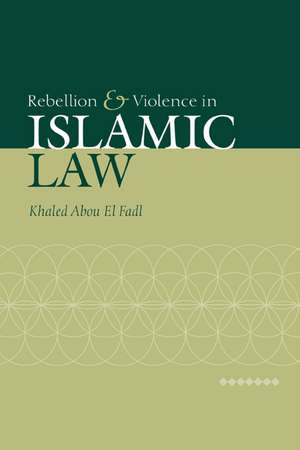Rebellion and Violence in Islamic Law
Autor Khaled Abou El Fadlen Limba Engleză Paperback – noi 2006
| Toate formatele și edițiile | Preț | Express |
|---|---|---|
| Paperback (1) | 276.77 lei 6-8 săpt. | |
| Cambridge University Press – noi 2006 | 276.77 lei 6-8 săpt. | |
| Hardback (1) | 863.30 lei 6-8 săpt. | |
| Cambridge University Press – 31 oct 2001 | 863.30 lei 6-8 săpt. |
Preț: 276.77 lei
Nou
Puncte Express: 415
Preț estimativ în valută:
52.96€ • 55.41$ • 43.99£
52.96€ • 55.41$ • 43.99£
Carte tipărită la comandă
Livrare economică 02-16 aprilie
Preluare comenzi: 021 569.72.76
Specificații
ISBN-13: 9780521030571
ISBN-10: 0521030579
Pagini: 404
Dimensiuni: 152 x 230 x 233 mm
Greutate: 0.61 kg
Editura: Cambridge University Press
Colecția Cambridge University Press
Locul publicării:Cambridge, United Kingdom
ISBN-10: 0521030579
Pagini: 404
Dimensiuni: 152 x 230 x 233 mm
Greutate: 0.61 kg
Editura: Cambridge University Press
Colecția Cambridge University Press
Locul publicării:Cambridge, United Kingdom
Cuprins
Preface and acknowledgments; Introduction; 1. Modern scholarship and reorienting the approach to rebellion; 2. The doctrinal foundations of the laws of rebellion; 3. The historical context and the creative response; 4. The rise of the juristic discourse on rebellion: fragmentation; 5. The spread of the Islamic law of rebellion from the fourth/tenth to the fifth/eleventh centuries; 6. Rebellion, insurgency and brigandage: the developed positions and the emergence of trends; 7. The developed non-Sunni positions; 8. Negotiating rebellion in Islamic law; Works cited; Indexes.
Recenzii
'This is an important, most interesting and challenging book which will shed light on Islamic law and pre-modern attitudes to dissidence and violence. El Fadl has written a brilliant, provocative and insightful study that must be read by everyone interested in understanding Islamic law.' Discourse
'Khaled Abou El Fadl's book is an exciting, thought-provoking and, ultimately, hugely successful attempt to break away from these paradigms. First, as Abou El Fadl points out, they make no sense. If any usurpation is legitimated, then the rebellion leading to the usurpation could not be categorically condemned. Second, the history of the early Muslim community is replete with rebellions and civil wars, championed by some of the most venerated figures in Islam. The attitude to rebellion in the generations that followed could not have been but ambiguous. Third, and this is the main argument of the book, the Islamic legal system actually has a law of rebellion that treats rebels with a confounding measure of tolerance … The author does a wonderful job of placing the discourse on rebellion in the context of a legal culture, where jurists are first and foremost loyal to the legal order and to the rule of law … Abou El Fadl's primary achievement of offering a fresh new perspective on the legacy of Islamic political thought, and one that is painfully relevant to our own days, in more than one way. The Islamic laws regarding banditry, for example, are effectively an attempt to classify and penalize acts of terror against defenceless civilians. In a fascinating postscript, the author also notes that the Islamic law of rebellion was completely excluded from the legal systems of the Arab world. He suggests, convincingly I think, that classical and post-classical Islamic law offers rebels leniency that would be unthinkable in many modern Middle Eastern states. In sum, Abou El Fadl's book demonstrates how an inquiry into the medieval Islamic past can be not only intellectually stimulating, but also a liberating exercise.' Middle Eastern Studies
'Khaled Abou El Fadl's book is an exciting, thought-provoking and, ultimately, hugely successful attempt to break away from these paradigms. First, as Abou El Fadl points out, they make no sense. If any usurpation is legitimated, then the rebellion leading to the usurpation could not be categorically condemned. Second, the history of the early Muslim community is replete with rebellions and civil wars, championed by some of the most venerated figures in Islam. The attitude to rebellion in the generations that followed could not have been but ambiguous. Third, and this is the main argument of the book, the Islamic legal system actually has a law of rebellion that treats rebels with a confounding measure of tolerance … The author does a wonderful job of placing the discourse on rebellion in the context of a legal culture, where jurists are first and foremost loyal to the legal order and to the rule of law … Abou El Fadl's primary achievement of offering a fresh new perspective on the legacy of Islamic political thought, and one that is painfully relevant to our own days, in more than one way. The Islamic laws regarding banditry, for example, are effectively an attempt to classify and penalize acts of terror against defenceless civilians. In a fascinating postscript, the author also notes that the Islamic law of rebellion was completely excluded from the legal systems of the Arab world. He suggests, convincingly I think, that classical and post-classical Islamic law offers rebels leniency that would be unthinkable in many modern Middle Eastern states. In sum, Abou El Fadl's book demonstrates how an inquiry into the medieval Islamic past can be not only intellectually stimulating, but also a liberating exercise.' Middle Eastern Studies
Notă biografică
Descriere
The first systematic treatment of political resistance and rebellion in Islamic law.












